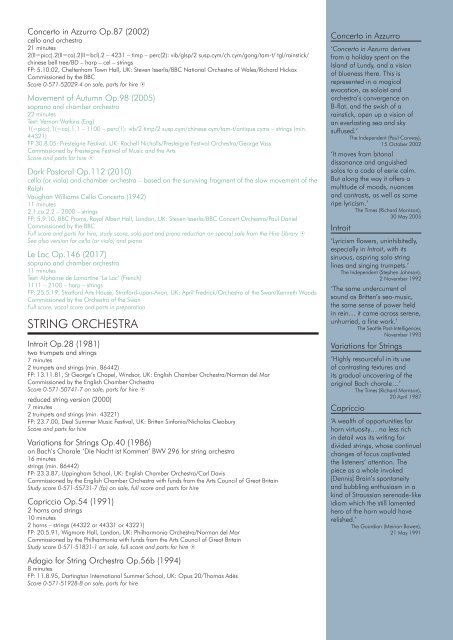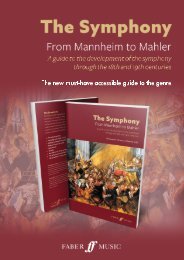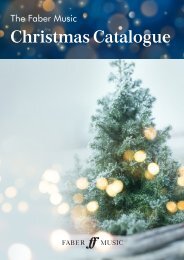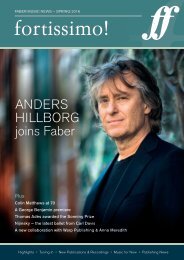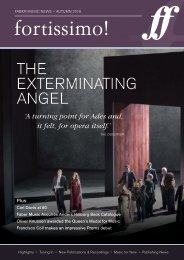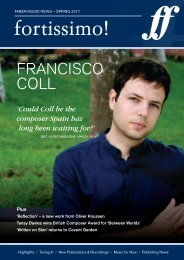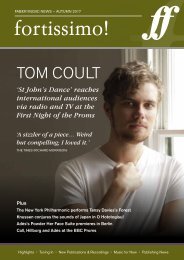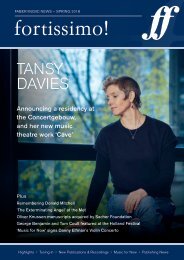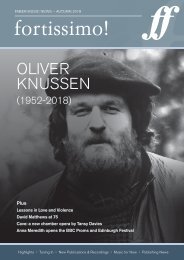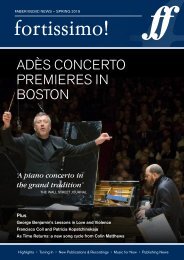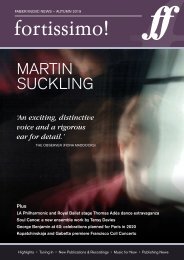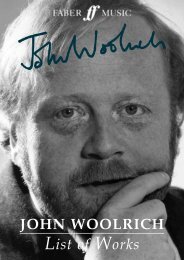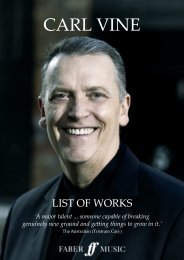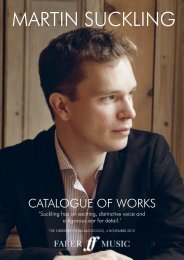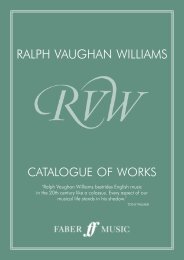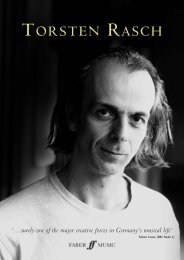David Matthews Catalogue of Works
One of the leading symphonists of our time, David Matthews is preoccupied with working in the great inherited forms of the past and the task of finding new ways to renew them. The natural world provides him with a constant source of inspiration. Peruse his catalogue of works available from Faber Music here.
One of the leading symphonists of our time, David Matthews is preoccupied with working in the great inherited forms of the past and the task of finding new ways to renew them. The natural world provides him with a constant source of inspiration. Peruse his catalogue of works available from Faber Music here.
You also want an ePaper? Increase the reach of your titles
YUMPU automatically turns print PDFs into web optimized ePapers that Google loves.
Concerto in Azzurro Op.87 (2002)<br />
cello and orchestra<br />
21 minutes<br />
2(II=picc).2(II=ca).2(II=bcl).2 – 4231 – timp – perc(2): vib/glsp/2 susp.cym/ch.cym/gong/tam-t/ tgl/rainstick/<br />
chinese bell tree/BD – harp – cel – strings<br />
FP: 5.10.02, Cheltenham Town Hall, UK: Steven Isserlis/BBC National Orchestra <strong>of</strong> Wales/Richard Hickox<br />
Commissioned by the BBC<br />
Score 0-571-52029-4 on sale, parts for hire 8<br />
Movement <strong>of</strong> Autumn Op.98 (2005)<br />
soprano and chamber orchestra<br />
22 minutes<br />
Text: Vernon Watkins (Eng)<br />
1(=picc).1(=ca).1.1 – 1100 – perc(1): vib/2 timp/2 susp.cym/chinese cym/tam-t/antique cyms – strings (min.<br />
44321)<br />
FP 30.8.05: Presteigne Festival, UK: Rachell Nicholls/Presteigne Festival Orchestra/George Vass<br />
Commissioned by Presteigne Festival <strong>of</strong> Music and the Arts<br />
Score and parts for hire 8<br />
Dark Pastoral Op.112 (2010)<br />
cello (or viola) and chamber orchestra – based on the surviving fragment <strong>of</strong> the slow movement <strong>of</strong> the<br />
Ralph<br />
Vaughan Williams Cello Concerto (1942)<br />
11 minutes<br />
2.1.ca.2.2 – 2000 – strings<br />
FP: 5.9.10, BBC Proms, Royal Albert Hall, London, UK: Steven Isserlis/BBC Concert Orchestra/Paul Daniel<br />
Commissioned by the BBC<br />
Full score and parts for hire, study score, solo part and piano reduction on special sale from the Hire Library 8<br />
See also version for cello (or viola) and piano<br />
Le Lac Op.146 (2017)<br />
soprano and chamber orchestra<br />
11 minutes<br />
Text: Alphonse de Lamartine ‘Le Lac’ (French)<br />
1111 – 2100 – harp – strings<br />
FP: 25.5.19, Stratford Arts House, Stratford-upon-Avon, UK: April Fredrick/Orchestra <strong>of</strong> the Swan/Kenneth Woods<br />
Commissioned by the Orchestra <strong>of</strong> the Swan<br />
Full score, vocal score and parts in preparation<br />
STRING ORCHESTRA<br />
Introit Op.28 (1981)<br />
two trumpets and strings<br />
7 minutes<br />
2 trumpets and strings (min. 86442)<br />
FP: 13.11.81, St George’s Chapel, Windsor, UK: English Chamber Orchestra/Norman del Mar<br />
Commissioned by the English Chamber Orchestra<br />
Score 0-571-50741-7 on sale, parts for hire 8<br />
reduced string version (2000)<br />
7 minutes<br />
2 trumpets and strings (min. 43221)<br />
FP: 23.7.00, Deal Summer Music Festival, UK: Britten Sinfonia/Nicholas Cleobury<br />
Score and parts for hire<br />
Variations for Strings Op.40 (1986)<br />
on Bach’s Chorale ‘Die Nacht ist Kommen’ BWV 296 for string orchestra<br />
16 minutes<br />
strings (min. 86442)<br />
FP: 23.3.87, Uppingham School, UK: English Chamber Orchestra/Carl Davis<br />
Commissioned by the English Chamber Orchestra with funds from the Arts Council <strong>of</strong> Great Britain<br />
Study score 0-571-55731-7 (fp) on sale, full score and parts for hire<br />
Capriccio Op.54 (1991)<br />
2 horns and strings<br />
10 minutes<br />
2 horns – strings (44322 or 44331 or 43221)<br />
FP: 20.5.91, Wigmore Hall, London, UK: Philharmonia Orchestra/Norman del Mar<br />
Commissioned by the Philharmonia with funds from the Arts Council <strong>of</strong> Great Britain<br />
Study score 0-571-51831-1 on sale, full score and parts for hire 8<br />
Adagio for String Orchestra Op.56b (1994)<br />
8 minutes<br />
FP: 11.8.95, Dartington International Summer School, UK: Opus 20/Thomas Adès<br />
Score 0-571-51928-8 on sale, parts for hire<br />
Concerto in Azzurro<br />
‘Concerto in Azzurro derives<br />
from a holiday spent on the<br />
Island <strong>of</strong> Lundy, and a vision<br />
<strong>of</strong> blueness there. This is<br />
represented in a magical<br />
evocation, as soloist and<br />
orchestra’s convergence on<br />
B-flat, and the swish <strong>of</strong> a<br />
rainstick, open up a vision <strong>of</strong><br />
an everlasting sea and sky<br />
suffused.’<br />
The Independent (Paul Conway),<br />
15 October 2002<br />
‘It moves from bitonal<br />
dissonance and anguished<br />
solos to a coda <strong>of</strong> eerie calm.<br />
But along the way it <strong>of</strong>fers a<br />
multitude <strong>of</strong> moods, nuances<br />
and contrasts, as well as some<br />
ripe lyricism.’<br />
The Times (Richard Morrison),<br />
30 May 2005<br />
Introit<br />
‘Lyricism flowers, uninhibitedly,<br />
especially in Introit, with its<br />
sinuous, aspiring solo string<br />
lines and singing trumpets.’<br />
The Independent (Stephen Johnson),<br />
2 November 1992<br />
‘The same undercurrent <strong>of</strong><br />
sound as Britten’s sea-music,<br />
the same sense <strong>of</strong> power held<br />
in rein… it came across serene,<br />
unhurried, a fine work.’<br />
The Seattle Post-Intelligencer,<br />
November 1993<br />
Variations for Strings<br />
‘Highly resourceful in its use<br />
<strong>of</strong> contrasting textures and<br />
its gradual uncovering <strong>of</strong> the<br />
original Bach chorale…’<br />
The Times (Richard Morrison),<br />
20 April 1987<br />
Capriccio<br />
‘A wealth <strong>of</strong> opportunities for<br />
horn virtuosity… no less rich<br />
in detail was its writing for<br />
divided strings, whose continual<br />
changes <strong>of</strong> focus captivated<br />
the listeners’ attention. The<br />
piece as a whole invoked<br />
[Dennis] Brain’s spontaneity<br />
and bubbling enthusiasm in a<br />
kind <strong>of</strong> Straussian serenade-like<br />
idiom which the still lamented<br />
hero <strong>of</strong> the horn would have<br />
relished.’<br />
The Guardian (Meirion Bowen),<br />
21 May 1991


